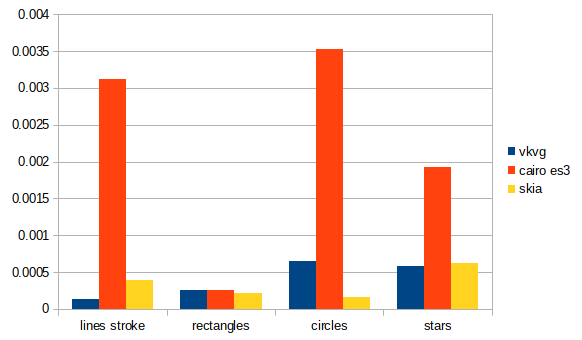vkvg is an open-source 2D graphics library written in C using Vulkan as backend. The API follows the same pattern as Cairo, but new functions and original drawing mechanics may be added.
vkvg is in early development stage, the API is subject to change. All contributions are welcome.
For API documentation and usage, please refer to the Cairo for now.
- Fill (stencil even-odd, non-zero with ear clipping).
- Stroke.
- Basic painting operation.
- Font system with caching operational.
- Linear Gradients.
- Line caps and joins.
- Context should be thread safe, extensive tests required.
- Image loading and writing with stb lib
- Test includes svg rendering with nanoSVG
- CMake: version >= 3.21
- Vulkan
- FontConfig: optional, without fontconfig, use
vkvg_load_font_from_path. - Freetype: optional, stb_truetype as alternative.
- Harfbuzz: optional, without complex text shaping may be wrong.
- GLSLC: spirv compiler, included in LunarG SDK: compile shader to spir-V (building only, optional)
- xxd: generate headers with precompiled shaders (building only, optional)
- GLFW: optional, if present tests are built.
if glslc or xxd are not present, a precompiled version of the shaders is stored in the git tree.
#fetch sources from github
git clone --recursive https://github.com/jpbruyere/vkvg.git
cd vkvg
# Create build directory
mkdir build
cd build
# Run CMake, optionaly setup glslc path
cmake ..
makeA detailed tutorial is available for Windows.
Append the -h option to see available command line parameters.
See the contribution guide for more information.
Join us on gitter for any question.
- v0.2.0
- radial gradients.
- better stroke joins handling.
- png saved in srgb format.
- doxygen cmake target and style
- Use Scissor where possible.
- Improve stroke algorithms.
- Radial gradients.
- Dashed lines.
- Operators.
- Optimize vulkan memory allocations by sub-allocating from a single shared memory chunk per type.
- Optimize command submissions.
- Test SDF font rendering.
- Avoid line joins inside curves and arc.
- Structured unit testing.
- Perf and memory checks.
- Code cleanup and comments.
- Documentations.



